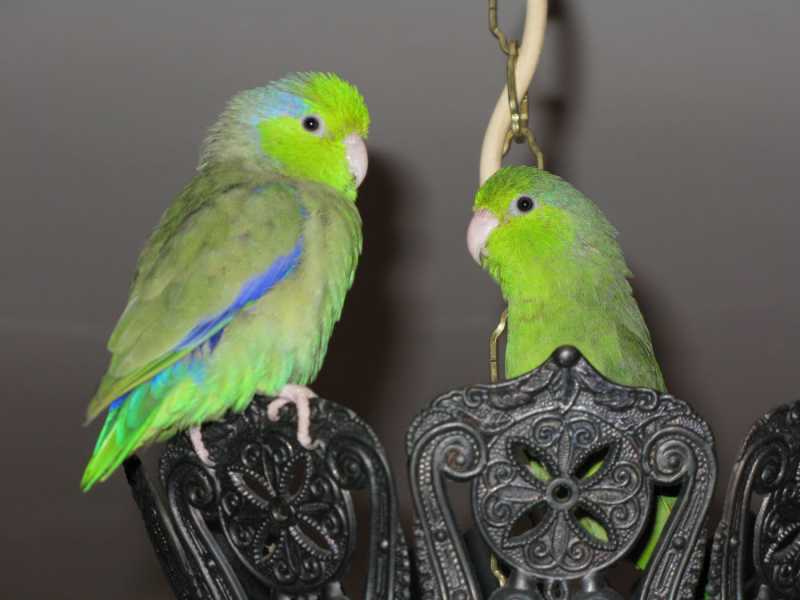 aking Care of Your New Baby
aking Care of Your New Babyby: Elizabeth Jones
 aking Care of Your New Baby
aking Care of Your New Baby
|
To make the adjustment easier for your little guy (and you), please try and use these simple tips for the next two weeks or so until he is fully adapted to his new surroundings. Remember that your bird is a baby and must learn many new things.  Food - Your parrotlet's normal diet should consist of chopped fruits, vegetables and greens, seeds Parrakeet Super or small hook bill or cockatiel mix) or pellets (for cockatiels), rice, pasta, cooked legumes, root vegetables and grains, wholegrain bread, sprouted seed and millet spray. If you change the diet, do it gradually!! The parrotlet may have not learned to associate different foods so be careful. Young parrotlets have been known to starve to death because their diet was switched too quickly and they did not eat the new food. For the first week or so, place your bird's food on the bottom of the cage in a paper plate or on a paper towel. Provide seed and/or pellets in small, flat dishes on the bottom. Also, be sure to give them as much millet as they want especially the first week. Then, you can gradually reduce the amount to a spray a couple of times a week. After he is seen eating out of the dishes regularly, you can move the rest of his food to small, flat dishes and then to the regular dishes provided with the cage. Avoid dishes with hoods on them; many parrotlets will not stick their heads inside and can starve to death. It is not unusual for baby parrotlets to consume large amounts of millet when they first go to a new home regardless of what they were fed at the breeder's aviary or pet shop. Going to a new environment is both stressful and overwhelming for a new baby although not always in a bad way. They have a new cage, new people, new environment, new toys, new climate, new everything. They may be very curious and inquisitive, and like a child in a candy store, may not eat a wide variety of foods especially fresh foods or event their normal seed/pellet mix. It is very normal and new parrotlet owners should always have lots of millet available when the baby comes home. Millet is a complex carbohydrate that also has protein and no fat. It is easily digested and provides quick energy for baby birds that need it to deal with the stress of the new situation. They should be allowed to eat as much as they want. Usually, after a week or so, they will start eating a greater variety although it make take several weeks or longer before they start eating fresh foods. To encourage them to eat fresh foods, you should provide your parrotlet with thawed frozen peas and corn in a small dish with some seeds sprinkled on the top. Once the parrotlet starts playing and eating these foods, then you can start adding other fresh, more wholesome foods to the mix. Parrotlets do not need grit. They hull (shell) their seed and grind their food with their beaks as do all parrots so there is not need for grit. Grit also has been known to cause impaction of the intestines so it should be avoided. They should be provided with a cuttlebone, for calcium, and a mineral block for needed trace minerals. The parrotlet will eat them as his nutritional needs dictate. Handling – Your parrotlet should have been hand-fed since 10 to 14 days of age and socialized to a variety of household situations. However, unlike domesticated animals such as dogs and cat, parrotlets are aware prey animals that you are a stranger and they must learn that you are not going to hurt them. They also are in a completely foreign environment with a new home, new cage, new toys, new people, new food, etc., so they are very cautious and can be very nervous for the first few weeks. Your parrotlet should be taken out daily and held over a couch or bed and allowed to jump off. This is how you should work with your parrotlet on teaching “Step Ups” and ‘ladders’. Let him jump off, pick him up, place him back on your finger and start over again. Praise and talk softly to the parrotlet while perched on your finger. Do this whenever you first take the bird out. After a few minutes, the parrotlet will stop jumping off. After a few days or so, they should be completely comfortable with you and should no longer jump off or try and get away. Stress - Remember your bird is a baby and he needs rest. When you first bring him home, put him in his cage and let him get used to the new environment. If the bird was shipped or had to travel a distance from the breeder, leave him in the cage the first day. On the second day, you can open the door and take him out for playtime. After about an hour, return him to his cage. He can then come out a few more times during the day. Do not continually play with him for hour after hour while he is very young. As he gets older, gradually his out of cage time can increase. Your baby is used to cuddling up against his siblings at night. Make sure his cage is placed in a warm area and cover him at night. Do not expose him to drafts. If your baby appears lethargic, quiet, weak, cold or is unable to perch, immediately place the bird's cage on a heating pad or under a light covered with a towel. Try and warm him up to 85°F - 88°F (29.5°C - 31.1°C) and get him to an avian veterinarian. Many times heat will work wonders and in a few hours they are up and running around. Sometimes, the stress of the new home, et cetera, can be a little much. Toys and Playpens - Parrotlets love to play and should be given a lot of toys. Things that move such as swings and hanging toys are favorites. They also like things made from natural materials such as wood, leather and raw hide. Small items such as beads and bells are especially relished and played with for hours on end. Parrotlets can be taught to stay on playpens and baskets. This will allow your pet more freedom as well as more time with you as he is more mobile and easy to move around. Water – provide clean water daily | |||||||||
|
Page created 20 April 2008 Last modified: 26 October, 2015 Iain D. Kendall Elizabeth Jones |